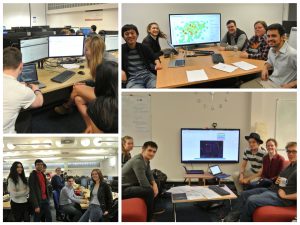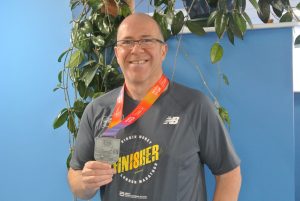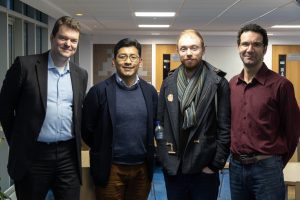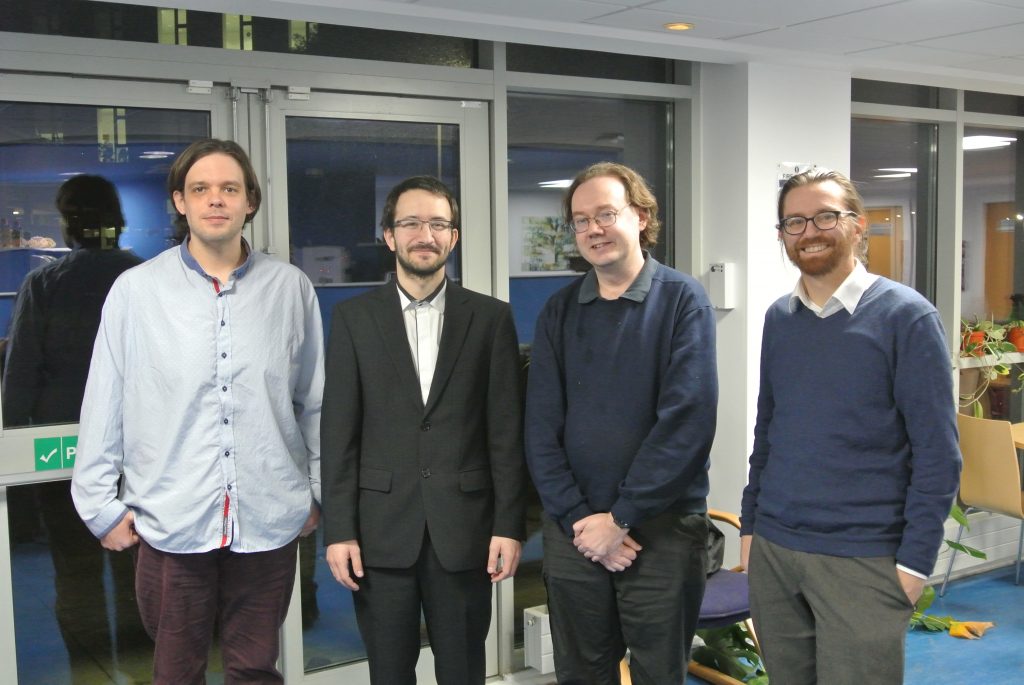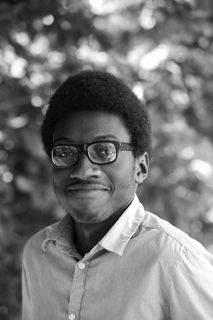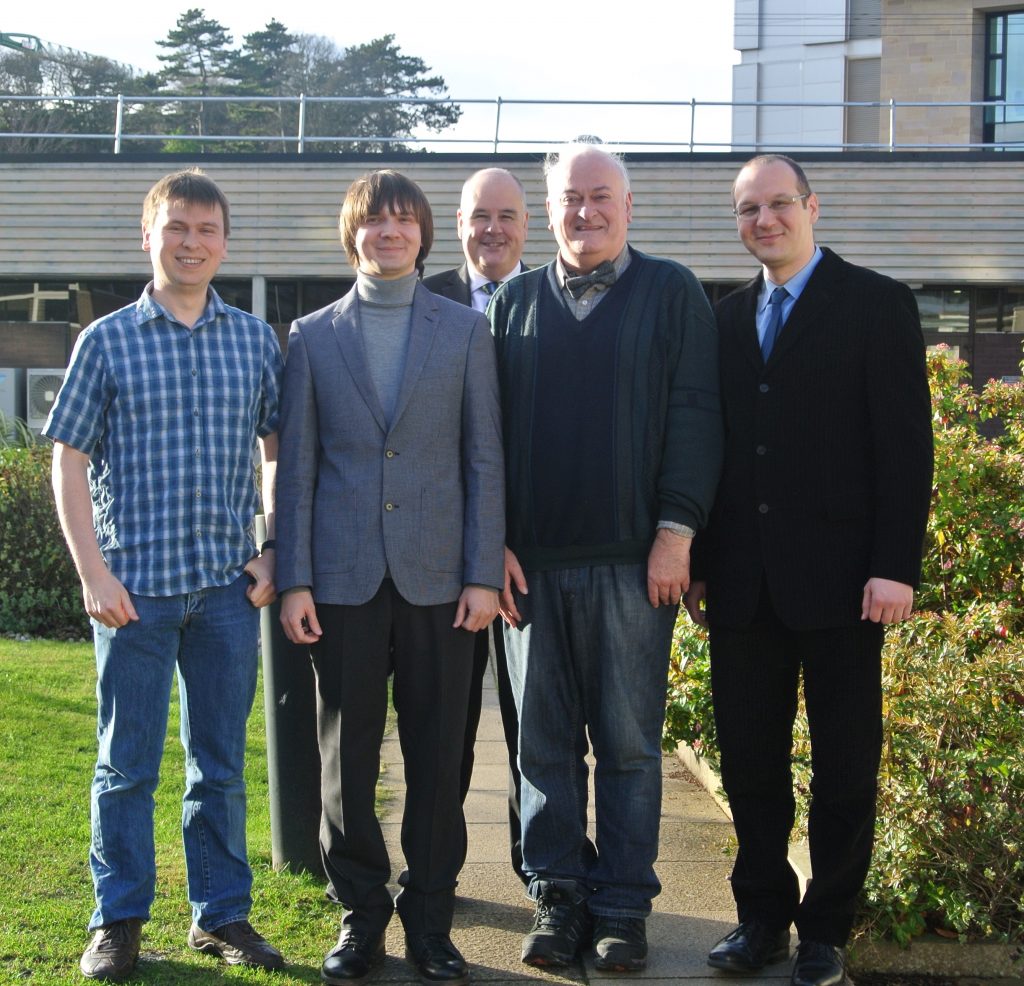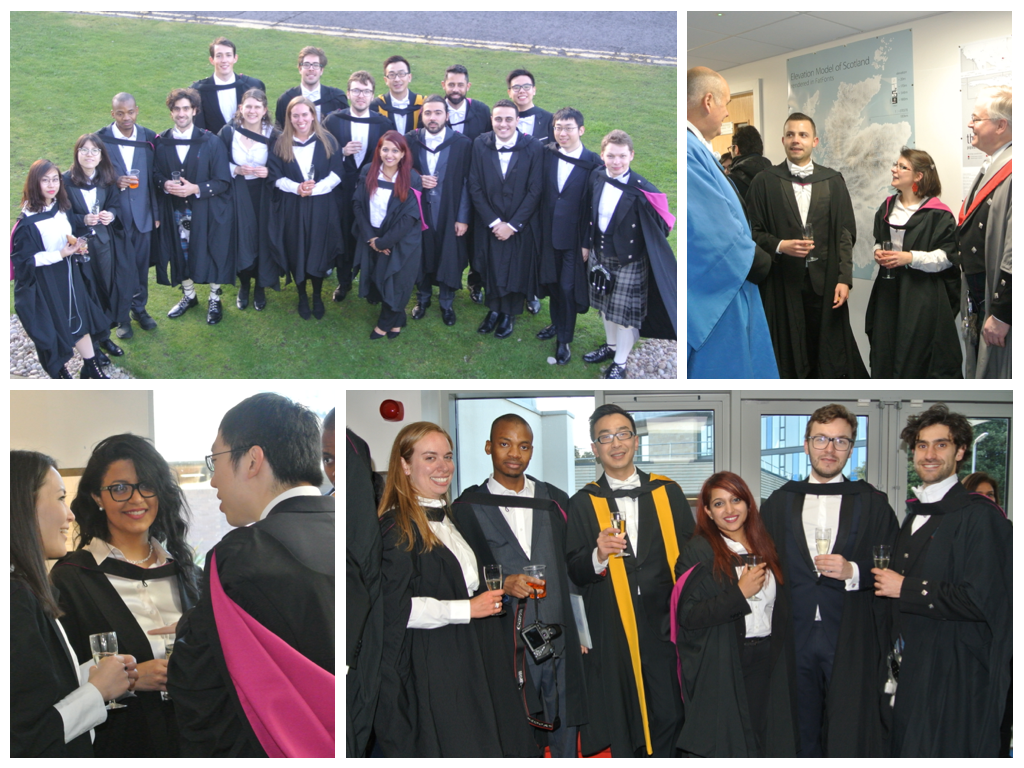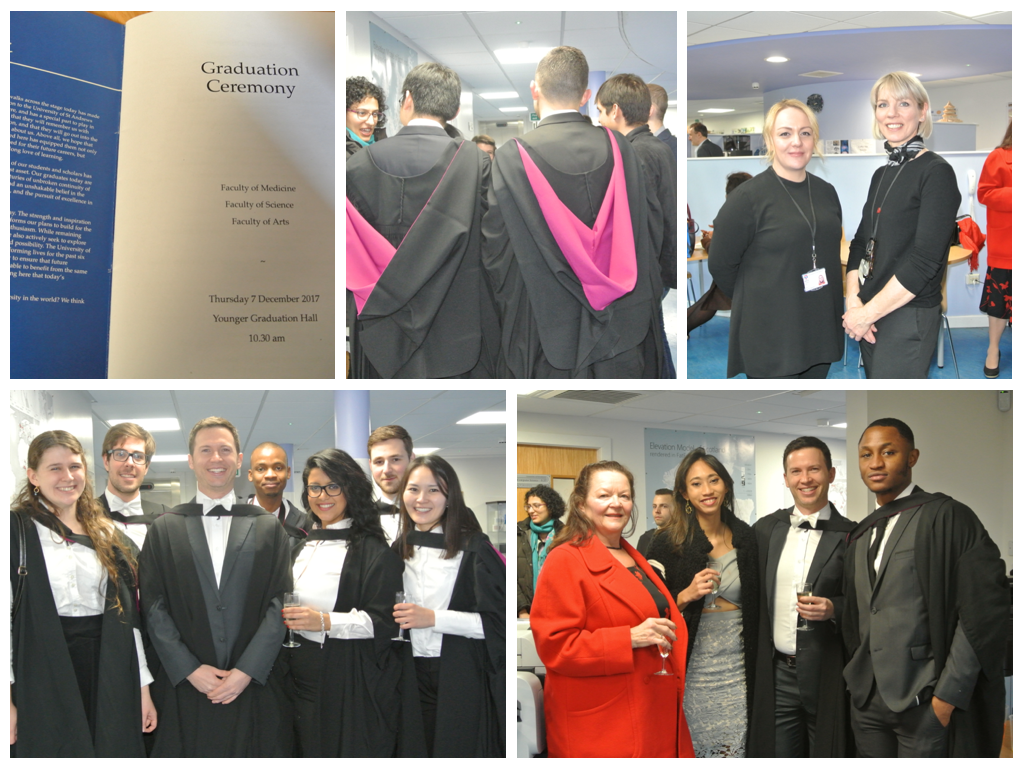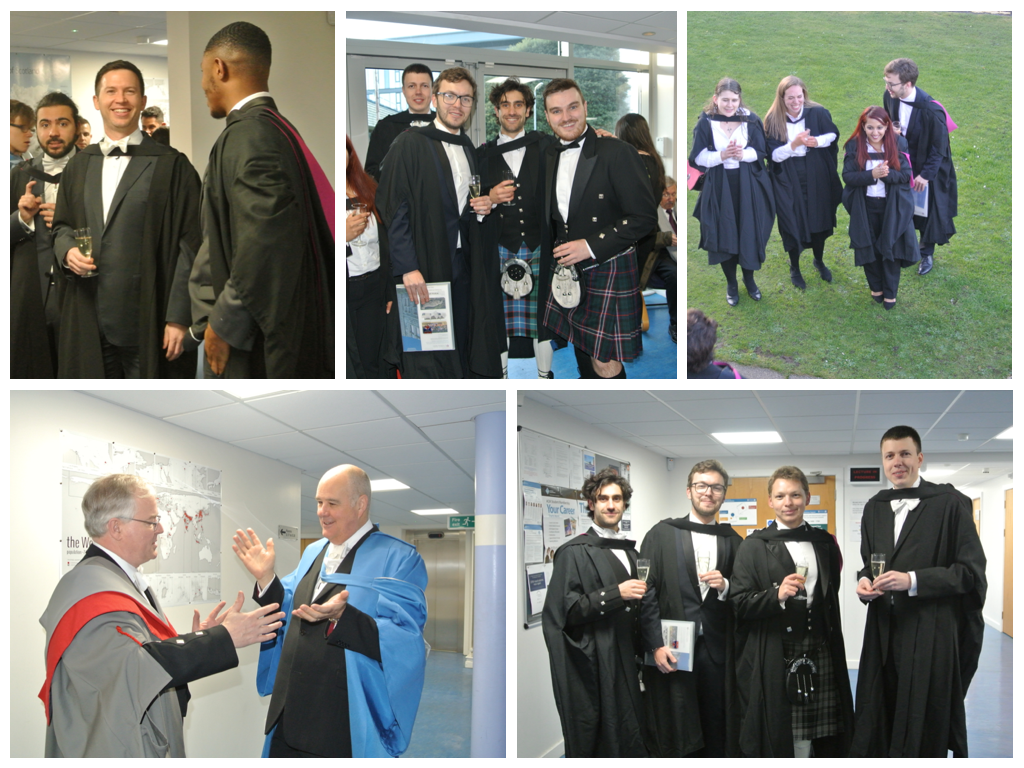Earlier today our hard working Junior Honours students presented their Team Projects. The projects involve substantial team based software engineering and rely heavily on collective development. There are many aspects of software and professional development along with considerable inter-team and intra-team collaborations. This year the students were asked to develop a software product intended for use by the School of Medicine. The teams demonstrated lots of creativity in developing back end, HCI and Machine learning aspects for their artefact. Thanks to all the students, supervisors and coordinators for their hard work this year. We wish all our junior honours students success with their forthcoming exams and we look forward to seeing them again for senior honours in September.
Author: lisa
Alex Bain completes 2018 London Marathon
Congratulations to School Manager Alex Bain, who completed the London Marathon for the third time earlier this month. Alex, runner no 32993, is pictured below with his finisher’s medal. Alex also completed the London Marathon in 2017 and 2016 raising funds for Guide dogs and worldwide cancer research.
PhD viva success: Percy Perez
Congratulations to Percy Perez, who successfully defended his thesis yesterday. He is pictured with supervisor Dr Alex Voss, Internal examiner, Dr Marwan Fayed and external examiner Dr Gareth Tyson, from Queen Mary University of London.
Image courtesy of Ryo Yanagida
PhD viva success: Gonzalo Mendez
Congratulations to Gonzalo Mendez, who successfully defended his thesis today. He is pictured with supervisor Dr Miguel Nacenta, Internal examiner, Dr Tristan Henderson and external examiner Associate Professor Samuel Huron, from Télécom ParisTech.
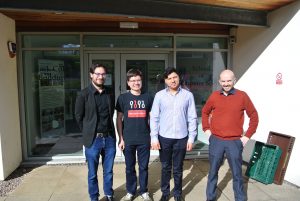
Image courtesy of Annemarie Paton.
Funding success for characterizing the adoption of ORCID ID in academic communities
Alex Voss from the School of Computer Science and Anna Clements and Eva Borger from the University Library have been awarded funding by OCLC for a 1-year project titled “Characterizing the adoption of ORCID ID in academic communities”.
ORCID iDs are persistent digital identifiers that distinguish researchers and, through integration in key research workflows such as manuscript and grant submission, support automated linkages between individuals and their professional activities ensuring that their work is recognized and attributed.
The funded project, which began in March, expands on a pilot study carried out in 2017 by Eva as part of her MSc dissertation project, which investigated the adoption and use of ORCID iDs among researchers at the University of St Andrews and identified key use cases and new avenues for advocacy.
The team now aim to carry out similar surveys at other institutions that integrate ORCID iDs and build a bigger picture of how advocacy, institutional processes and mandates relate to the adoption of ORCID iDs in academic communities. Based on these findings, they plan to formulate recommendations on how advocacy and policies regarding ORCID iDs can be employed to maximise their value in the research process.
Alex Voss has a related MSc dissertation, Consolidating Output and Citations Data, for students interested in this particular project or research area.
If you would like to find out more about ORCID iDs at the University of St Andrews, visit their ORCID pages. For more information about the project, please contact Alex Voss at alex.voss@st-andrews.ac.uk or visit the ORCID study blog for ongoing updates.
Scholarships and bursaries: student perspectives and experiences
Applying to study at university includes many financial considerations. Scholarships and bursaries can help reward academic achievement and provide financial awards enabling students to undertake or further their education. Students in Computer Science have secured a variety of bursaries to help fund their passion for the subject. Successful undergraduate and postgraduate student perspectives are highlighted below.
Sherlock Cruz , the first recipient of The London Scholarship reflected on his time at St Andrews and how scholarships can transform lives. The scholarship encourages young students from the Greater London area to study at St Andrews by equipping them with accommodation and living costs.
The School is fortunate in receiving on-going support from Adobe for undergraduate students studying Computer Science by way of Adobe Prize Bursaries. Successful applicants receive an award each year for the duration of their degree.
Henry Hargreaves was the successful recipient of a Royal Television Society Technology Bursary. The bursary encourages the most talented Engineering and Computer Sciences undergraduates to consider a career in television.
Alice Herbison secured a Carnegie-Cameron Bursary to support postgraduate study enabling her to undertake our MSc in Human Computer Interaction.
Arkwright Awards for budding young engineers nurtures high-potential A-level and Scottish Advanced Higher students who have a desire to be future leaders in engineering disciplines, including computing, software, communications and product design. More information on Arkwright engineering awards and who can apply can be located on their website.
The scholarships and funding catalogue has up-to-date information on eligibility for undergraduate and postgraduate applicants.
PhD viva success: Matus Tejiscak
Congratulations to Matus Tejiscak, who successfully defended his thesis yesterday. He is pictured with supervisor Dr Edwin Brady, Internal examiner Dr Chris Jefferson and external examiner Dr Andreas Abel, from the University of Gothenburg.
Computer Science student launches UK-wide app: Shrowze.

“The Human Personal Assistant you summon by text”
Computer Science student Nnamdi Ekwe-Ekwe launches a UK-wide app today, that frees up your time to do what you want to do rather than what you have to do. Shrowze is an app that provides everyone with their own human personal assistant to help them with whatever they need to do. It is the Human Personal Assistant you summon by text.
Nnamdi a PhD student in the School, built Shrowze in response to how long he saw it took people (himself included) to complete tasks that should be simple and straightforward (such as finding accommodation, booking a flight, organising and booking a meal, getting a plumber, etc.)
Nnamdi notes,
“As a full-time student I’ve always wanted to have more time for myself and concentrate on the truly important things, while not neglecting the numerous commitments I have every day – a problem shared by millions the world over. I just remember spending lots of time on routine everyday things that needed doing, when instead I could have been spending my time more usefully.”
With Shrowze, whatever it is you need doing, whatever it is you need getting, from wherever in the world, their team of human personal assistants can help – all you have to do is send a text. Shrowze has been trialed over the past 6 months with the general public and with students, receiving great feedback.
“Hi, I’m looking for accommodation for next year. This is my budget, and it’s going to be 4 of us sharing. Can you give us some potential places and book us viewings?”
“Hi, can you find me cheap flights to Barcelona for next week? And accommodation, and also give me a list of things to do there?”
“Hi, can you book me the best but cheapest taxi to the station? Three of us are going, we have two pieces of luggage!”
Shrowze is now live for all users across the country. For the next two weeks, anybody who signs up with Shrowze, will get 1 hour free time to have access to their own human personal assistant. Additionally, all students get a special 50% discount for as long as they are a student to use Shrowze.
Website – https://www.shrowze.co.uk/
Nnamdi Ekwe-Ekwe completed his undergraduate degree at the University of Leicester before studying for his Masters in Advanced Computer Science at the University of St Andrews and is currently a PhD student with a focus on Cloud Computing.
Text and images courtesy of Darcy Roberts, Communications Team, Shrowze and Nnamdi.
PhD viva success: Alexander Murashko
Congratulations to Alexander Murashko, who successfully defended his thesis last week. Alexander is pictured with External Examiner, Professor Paul McKevitt from Ulster University, Internal Examiner Dr Kasim Terzic, Convener Professor Alan Dearle and Supervisor Dr John Thomson.
Image courtesy of Annemarie Paton.
December Graduation Reception
Congratulations to the Masters Class of 2017, and MPhil student Yunjia Wang, who graduated last week. Each year, students are invited to a reception in Computer Science, to celebrate their achievement and reflect on their time in the School.
Our graduates move on to a wide variety of interesting and challenging employment and further study opportunities, and we wish them all well with their future careers.


